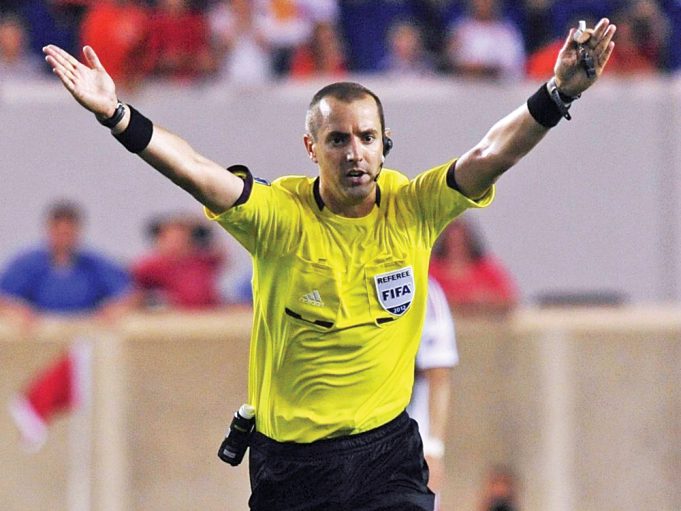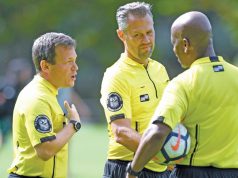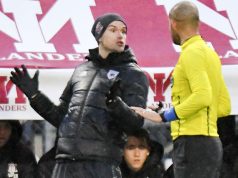By his own proud admission, the man is a nerd. Conjure images of that wisp of a kid you remember from high school who had a pocket protector, wore black socks to gym class and aced so many tests that you desperately maneuvered to sit within eye-stretching distance of him and you’ll veer in the direction of Mark Geiger’s character profile. In terms of athleticism, he was once actually recruited — but only because his high school freshman soccer team at Toms River South didn’t have enough bodies. And in a particular irony considering he would one day master soccer in a capacity he couldn’t have dreamed of back in his late 1980s high school days, Geiger was so invisible and injury-prone during his one season on the team that he was pursuing cross country by his sophomore year.
Call him Geiger the Geek. Call him “Sheldon,” the lovable dork from The Big Bang Theory, which is what his former math students at Lacey Township High School in Lanoka Harbor, N.J., affectionately nicknamed him. Hell, this math geek somehow inspired his students to such an extent that they used to gleefully present him with pies each March 14, which is the mathematical holiday Pi Day. A calculator truly was this man’s best friend back in the days when drawing a FIFA World Cup assignment was but an elusive dream.
“Nobody else’s eyes light up more and nobody else has a bigger smile than Mark when 3.14 comes,” said Canadian assistant referee Joe Fletcher. “He probably celebrates on the 14th of March.”
Yes, as a matter of fact, Geiger does just that.
“I’m a nerd,” he concedes. “I love my calculator and when my students call me ‘Sheldon,’ it’s not too far off.”
But humor of that sort is washed away by respect as forcefully as a sandcastle on the crest of a surging surf when this 40-year-old native of Toms River, N.J., is singled out for his life achievements. He shook hands with President Barack Obama at the White House in 2009 after being named one of 103 recipients of the Presidential Award of Excellence in Math and Science Teaching. Five years later, after he had made the courageous career move to leave behind a magnificent 17-year body of work as a teacher to take officiating to a new level, he was working in Brazil as the first American to referee a knockout stage match in World Cup competition when he officiated the France-Nigeria showdown.
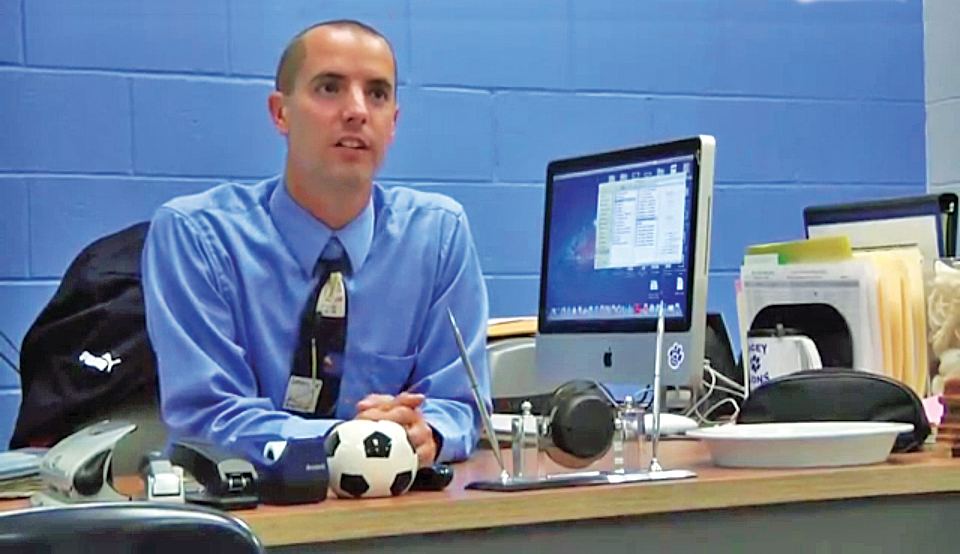 Two careers, the first of which earned him national recognition and the second of which raised the ante to international proportions. Not too shabby, “Sheldon.” Not too shabby at all. If life truly begins at 40, what could this man possibly have in mind for a career encore?
Two careers, the first of which earned him national recognition and the second of which raised the ante to international proportions. Not too shabby, “Sheldon.” Not too shabby at all. If life truly begins at 40, what could this man possibly have in mind for a career encore?
“It’s amazing that someone could do that in one lifetime, and within four years of each other,” said Joe Romayo, a 2002 Lacey Township graduate who was so influenced by Geiger’s mastery in the classroom that he would one day return to his alma mater as a history teacher. “It’s absolutely insane.”
Insane, indeed. Dan Sheedy, another of Geiger’s former students, applied that same adjective to Geiger when assessing his mind-boggling resume.
“It’s crazy how well he’s been doing,” Sheedy said. “He stopped teaching to pursue his dream of refereeing, which is really admirable, and he went on to become one of the best referees at the World Cup last year, which is insane. For an American, that doesn’t happen too often.”
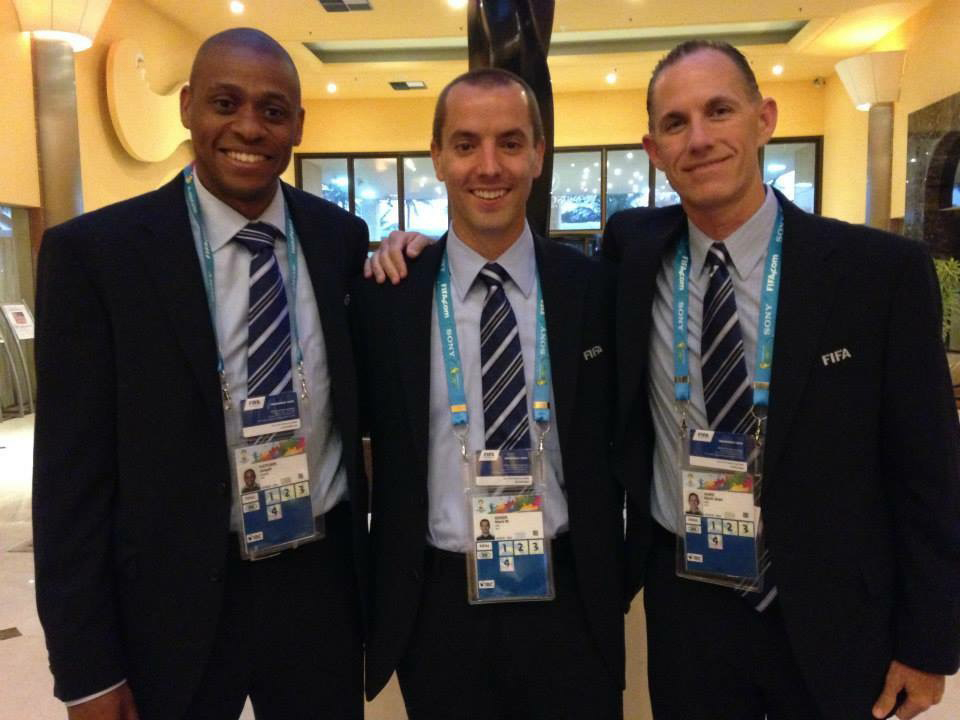
And to think there was a time when Geiger, the MLS Referee of the Year in 2011 and ’14, was simply lost on soccer fields when he first pursued officiating. If he was invisible in his sole season as a soccer player, he was nondescript when he first pursued officiating as a teenager in the late 1980s. Geiger had the right intentions and a developing idea of an officiating dynamic, but he still hadn’t approached accumulating enough funds of experience to cover the checks he was mentally writing during competition.
“He was always very shy,” said Brian Fenlon, one of Geiger’s first officiating mentors. “If you were to ask me back when I first started refereeing with Mark that he would attain the level that he’s at now, I would say that that would be impossible. But it was the old story where the pupil far surpasses the teacher.”
Against All Odds
Geiger himself couldn’t have envisioned the heights he would attain back in the days when he was a novice official. No way did this guy fit the profile of a soccer official, let alone a future great.
“I don’t know if I would have believed you,” Geiger said when asked how he would have responded had anyone suggested back in the day that he would attain these heights. “When I was in college, MLS just started. I graduated from college in ’96 and MLS started in ’96. At that point, I had done some state and regional competition and I set a goal at that point to do one match, to get myself to the level where I could go out on the field and referee one game and see where it takes me. If things go well, maybe I’ll get a second and if things don’t go well, at least I gave it every shot that I had.”
This nerd went on to kick sand into the face of the bully. And now he’s a World Cup veteran looking ahead at what the next 10 years might bring him. God only knows what that will be given his track record from the last quarter century.
“I admire Mark first and foremost as a wonderful human being who has it all — intelligence, passion, humility and discipline to do the hard work,” officiating great Esse Baharmast said. “He gets everything done the old-fashioned way and whatever accolades come his way are truly earned by his dedication and his constant pursuit of excellence.”
We take you back to Room W-203 on the west wing of Lacey Township High School, a two-story red brick building just east of the New Jersey Pine Barrens in a middle-class community pretty much smack dab in the middle between New York City and Philadelphia. It wasn’t just any classroom for a teacher who had been doubling as an MLS official since 2004 and was added to U.S. Soccer’s international panel for FIFA in 2008, enabling him to work international friendlies, the CONCACAF, Champions League and other international tournaments.
Especially by the latter half of Geiger’s teaching years, his classroom walls were cluttered with posters, two-by-three-foot flags representing countries in which he refereed and other items representing his passions of math and soccer. Anything his students brought in was suitable for posterity on Geiger’s personal Wall of Fame. Oh, yes, there was also a poster during his last year on staff of Sheldon Cooper in honor of Geiger, everyone’s favorite nerd at Lacey Township.
“He had so much math jargon up on the walls,” Sheedy said. “He just loved math so much that you could just see that when he taught it. He would be telling us how to derive something or how to integrate something and you could just see him getting excited about it.
“And not only did he have math stuff on the walls, he had soccer stuff. He had flags from different countries hanging in front of the room. The back row had one more than the front so that they were staggered and it definitely looked pretty cool.”
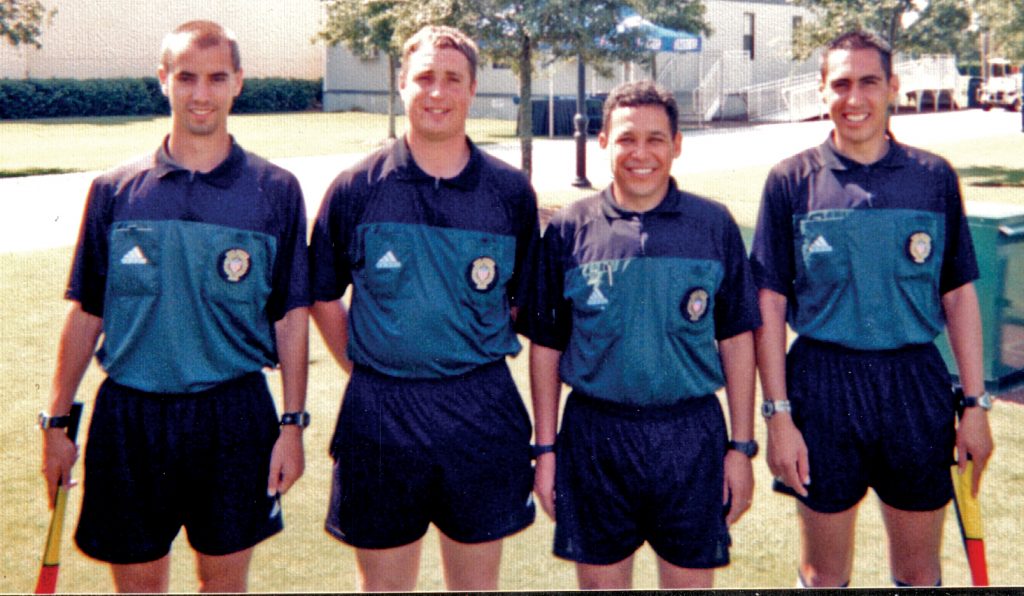
From 1996 until he left teaching early in 2013 to pursue soccer officiating at the highest level, the engaging, personable Geiger breathed excitement into mundane numbers in his math class, tuning into students who were hell-bent on tuning out. He considered each of his students to be the sons and daughters that this life-long bachelor doesn’t have to this day and Geiger managed to make a connection to darn near everybody who ever took a seat in the spectacularly-decorated W-203.
“I loved the subject and I really liked making math fun for my students,” Geiger said.
Like Sheedy, who loved math about as much as a bee sting.
“I hated math ever since I could remember,” said Sheedy, who is now enrolled at Stevens Institute of Technology in Hoboken, N.J. “I could a never relate to it. It was the old thing where you thought, ‘I’m never going to use this.’ But he changed that and succeeded in getting me to appreciate math. Because now in college, I sit there in the math class and I think, ‘Wow, this stuff is pretty cool. I can see a use behind it.’ To take someone who really hated math and make him appreciate it is pretty crazy.”
Count Romayo as another in the legion of Geiger’s converts.
“I hated math,” Romayo said. “Math used to give me cold sweats. But sitting in his class, I felt very comfortable and confident as a student and I didn’t worry about anything. I was really struggling one marking period and Mark always had this policy where if you came to him for help, he would sit down with you one-on-one, take you through practice problems and maybe even give you a test that you had failed or had done poorly on. And he would take you through the problems and explain why you had made those mistakes.”
Does “popular” adequately cover it with Geiger as a teacher? Not hardly.
“The word would be ‘revered,’” Romayo said. “He was revered by students and he was revered by colleagues and administrators.”
Lacey Township, which first opened its doors in 1981, carries on as a fine educational institution. But it lost something that will never be adequately replaced that day in February 2013 when Geiger left the security of this profession to stretch the limits of another.
“Sometimes he would leave on Friday and when you saw him on Monday and ask, ‘Where were you?’ he would say, ‘Oh I was out of the country,’” Lacey Township Principal James Handschuch said. “He was all over the place, so I think people really realized that he had this going on and knew it was his dream. So when he said he was leaving, it wasn’t a huge shock because we all knew that is where he aspired to be. You don’t want to lose a quality teacher and that’s what he was. But you knew he was going to be a quality official, too, because that’s just the character he is.”
Just how difficult was the decision to walk away from something that was such a part of his world?
“That’s a great question,” Geiger said. “I wanted to do as much as I could with refereeing and I was on a road to possibly go to the World Cup. And I think that if I would have continued teaching, that would have been something I regretted. I would have regretted not seeing what I was capable of doing as a referee. And because I can always go back to teaching later, I’m doing everything I can with refereeing.”
What makes Geiger’s ascension as an official all the more fascinating is how much he progressed as he climbed from a 13-year-old kid working the U-8 and U-14 matches in 1988 to the state level in 1997 and the national plateau in 2003. He had the same conviction as a student of officiating that he did as a teacher of math.
Strong Foundation
And the foundation certainly was in place. Ron and Judy Geiger’s three children — Steven and Karen would follow Mark — were raised in a fertile soccer environment. Ron Geiger was a dentist who worked long hours, but Judy, a retired gym teacher who enrolled her three children in the Beachwood Soccer Club by the time they were six, remained a constant influence in her children’s lives until she died at age 68 in 2012. Ron pushed the education and Judy focused more on the extracurricular activities.
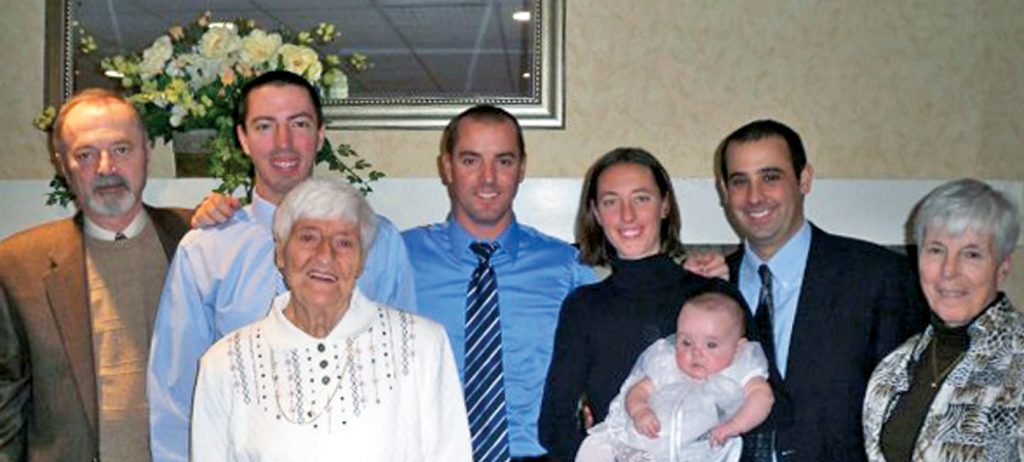
She was always in the crowd for Mark’s indoor soccer league games after he graduated with a B.A. in mathematics from Trenton State College (now the College of New Jersey), even if they began at 11 at night. She was a regular at every game when her son served as Lacey Township’s assistant girls’ soccer coach for 11 years, including scorekeeper and timer duties. And as Mark started scaling heights as an official, she served as his sounding board.
“She watched all my games on TV and she was always the first phone call I made after the match just to get her take on how everything went,” Geiger said.
He served a demanding apprenticeship. It was quite a learning experience for Geiger on the amateur fields of Elizabeth, Newark, South River, Piscataway, Lincrost and other New Jersey cities where folks make an enormous emotional investment in their favorite team, many of which are ethnic-based. Strong turnouts were the norm for those amateur matches and passionate — and frequently misguided — energy was in the air.
“Amateur ball is all about survival,” Geiger said.
Officials routinely backed their cars into parking spaces. Their bags were never taken to the field. Keys were attached to their referee whistle in case a quick getaway was necessary. Geiger recalls the common saying among officials is that the rulebook is paperback so rules can therefore be bent to placate the agitated fans. And then there are the players who spit at, bumped and threatened Geiger. In fact, he mentions, most of the referees working the MLS came from the big cities, where they were toughened by fans constantly on the brink.
“I was running the line and I can remember the player,” Geiger said. “He was a big, big, big guy from Poland and he had just scored a big goal in the game and he was offside. So I’m standing there and I’ve got the flag up and he’s ready to celebrate. He sees me with the flag up and, all of a sudden, he starts running after me, like running straight at me.
“I’m backing up and I’m thinking to myself the whole time, ‘All right, this is it. I’m going to get hit.’ He got into my face and he screamed and yelled, but he never threw a punch or anything like that. But that’s some of the stuff we dealt with. But even though there was this element of risk in those games, I enjoyed it. It made me work harder in the games because I knew if I really slacked off or I didn’t give my best effort, there really could be problems.”
There’s another element Geiger singles out in his ascension to elite levels — not being an outstanding athlete in contrast to his siblings. Steven earned All-Big East Conference honors at Rutgers as a member of the distance medley relay in track. Karen started at center-midfielder for the College of New Jersey on its 2000 NCAA Division III national championship soccer team.
“Because I didn’t play at a high level, I didn’t play in college, I had to learn a lot more than the person who may have played at that high level,” the 5-foot-10, 160-pound Geiger said. “So when I started doing the amateurs, there was a big learning curve for me, especially in the ethnic soccer game, learning what the foul in the Hispanic game was versus what the foul was with Portuguese players and Eastern European players.”
All of the elements that make Geiger what he is, started materializing with the certainty of the math equations he so savors. An almost peerless officiating dynamic developed and Geiger was on his way.
“During those years, we worked many amateur matches together and, in time, it was his turn to take the whistle,” said Barry Towbin, another mentor. “What stood out to me is his ability to feel the game. He knew when to intrude and when to hold back, when to talk, caution, adhere to the letter of the law and when to be liberal.”
Michael Kennedy, the Professional Referee Organization’s referees manager, sees those same attributes.
“I think what makes him so good is he is consistent and displays that hard-working effort to get in good angles to ensure his decision making is correct,” Kennedy said. “He is always looking to improve, he is a student of the modern game and the physical demands that are required to stay with the top athletes of the world. Even though he has reached the top level of officiating he remains humble, he usually is the first person in the room during our referee meetings and always tries to bring his best game every game.”
But even the best go through trying circumstances, which, in Geiger’s case, proved to be a career epiphany. It was between D.C. United and the Los Angeles Galaxy in a MLS game in Washington D.C. on Aug. 26, 2006, Geiger’s third year in the league. The match had progressed without incident for 80 minutes when Geiger neglected to assess a red card after a tackle. Dominic Mediate of D.C. United, the player who was tackled, suffered a broken leg. Following a conference call the next day with Paul Tamberino, director of referees for U.S. Soccer, and Baharmast, who served as a U.S. Soccer referee manager, Geiger was informed that he would not be receiving any more assignments that season.
Until he returned to work an NCAA Division II game and an amateur match in New Jersey that November — he resumed working matches for the MLS for the 2007 season — Geiger took time out to reflect. In retrospect, he can say that he wouldn’t be where he is today without that incident.
“I needed this to happen,” Geiger insisted. “I would not be where I am now, I would not have gone to the World Cup, if this incident wouldn’t have happened. I needed to have this adjustment in my ego, my attitude, whatever it was. That’s the silver lining in all of this.
“I am mortified that the player ended up with a broken leg. I feel guilty about that. But when I look back on my career, that was my turning point because that changed my focus, that changed my outlook and it changed my attitude. I think I was just too comfortable. I talked to some mentors after that and I knew the problem was with me at the point.”
Reaching the Pinnacle
So many forces shaped Geiger into the efficient, authoritative, respected referee he has become. Just ask those in the officiating community.
Like Sandra Hunt, who worked the 1999 and 2003 Women’s World Cups.
“I attended a couple camps as an assessor. Sitting in a room and listening to him participate as an official when they break down the clips and address what would have been the preferred outcome, listening to him articulate how his mind works and how he has learned so much about the game, that is impressive,” she said. “He is able to do that without being defensive. What he’s able to demonstrate and what I’ve been able to observe is really indicative of how highly he’s evolved as a human being, a man and an official.”
Like Brian Hall, who worked the 2002 World Cup.
“Mark constantly works to advance officials of all levels,” Hall said. “He is constantly mentoring and coaching officials down to the grassroots level. For example, he heads the elite referee development program in New Jersey. He monitors a discussion board of up-and-coming officials and ensures a consistent decision is reached. Despite his busy domestic and international schedule, Mark is a regular at tournaments and other events, lending his expertise and experience to enrich the growth of the everyday official.”
And like Sean Hurd, who worked the 2014 World Cup with Geiger and Fletcher.
“Back in 2011, we were at the FIFA Under 20 World Cup in Columbia,” Hurd said. “We were new to the World Cup cycle and really did not have much in the way of expectations as to how we would do the tournament. Mark, Joe and myself were all nervous, but being the leader he is, Mark guided us through our matches and we ended up refereeing the final.
“It was the beginning of a string of great experiences. Mark’s motto of ‘one game at a time,’ stuck with us and became our calling card all the way through the World Cup last summer.”
Geiger has gone further in the World Cup than any U.S. men’s referee before him. Will he remember this as the pinnacle of his career? Not necessarily. After all, with his skills, anything is possible.
“I’d like to go 10 more years,” Geiger said. “Internationally, I’ll probably be done at 45 and then from there, just like all the other guys who are at the age, I’ll take it year by year. If the body is still good and I have the passion, then I’m going to keep on going.”
What's Your Call? Leave a Comment:
Note: This article is archival in nature. Rules, interpretations, mechanics, philosophies and other information may or may not be correct for the current year.
This article is the copyright of ©Referee Enterprises, Inc., and may not be republished in whole or in part online, in print or in any capacity without expressed written permission from Referee. The article is made available for educational use by individuals.

